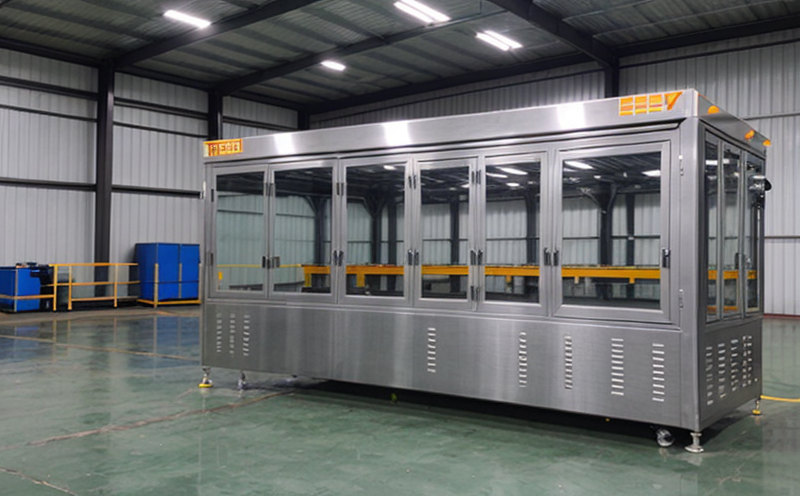ISO 6508 Rockwell Hardness for Metallic Materials
The ISO 6508 standard specifies a method of hardness testing using the Rockwell hardness scale, which is particularly applicable to metallic materials. This test measures the hardness of metals by determining the depth of penetration made into the surface under a specific load. The Rockwell hardness number (HR) indicates the relative hardness of different materials based on this measurement.
The process involves placing a small indenter or ball against the sample's surface, applying pressure with a specified pre-load and then measuring the indentation depth after additional force is applied. The difference between these two depths determines the hardness value.
For metals, this test can be used to ensure quality control during manufacturing processes, verify material specifications, and assess the effectiveness of heat treatment or other surface treatments. It plays a crucial role in industries where the mechanical properties of materials are critical for performance and longevity.
The Rockwell hardness scale has several scales (e.g., HRA, HRB, HRC), each designed for different ranges of hardness values. For metallic materials, the HRC scale is commonly used, especially for hardened steel parts like metal packaging components.
Accurate testing using ISO 6508 ensures that the packaging meets strict quality standards, enhancing its durability and performance in various environments. This standard is widely recognized and adhered to by manufacturers globally, ensuring consistent results across different laboratories.
| Hardness Range | Material Suitability | Suitable for Testing |
|---|---|---|
| HRC: 20-78 HR | High carbon steel, quenched parts, hardened tools. | Metallic materials used in packaging components like cans and lids. |
| HRA: 15-86 HRA | Titanium alloys, stainless steels, tool steels. | Metals used in high-strength structural elements within metal packaging. |
The Rockwell hardness test is essential for ensuring that the metallic components of packaging meet stringent quality and performance standards. By adhering to ISO 6508, manufacturers can guarantee the reliability and longevity of their products, which is critical in sectors like food and beverage.
Understanding the nuances of this testing method helps ensure accurate results and compliance with international standards. This is especially important for industries that rely on precise measurements of material properties to maintain product integrity and safety.
Industry Applications
- Quality control during manufacturing processes
- Verification of material specifications
- Evaluation of the effectiveness of heat treatment or surface treatments
- Detection of defects in metallic packaging components
- Assessment of metal strength and durability for prolonged shelf life
- Sustaining performance under various environmental conditions
| Industry | Specific Application |
|---|---|
| Beverage Industry | Testing of cans and lids for beverage packaging to ensure they withstand pressure and temperature changes. |
| Food Industry | Evaluation of metal containers used in food storage to guarantee safety and quality. |
The Rockwell hardness test is indispensable for ensuring the integrity and performance of metallic materials across various sectors. Its ability to provide precise, repeatable results makes it a cornerstone of quality assurance in industries that depend heavily on metal packaging.
Why Choose This Test
- Accuracy: The Rockwell hardness test provides consistent and accurate measurements across different laboratories, ensuring reliable data for decision-making.
- Rapid Testing: It is a relatively fast method compared to other mechanical tests, allowing for quicker feedback on material properties.
- Non-Destructive: The test does not damage the sample, making it suitable for testing critical components without compromising their integrity.
- Reproducibility: Results are highly reproducible, which is essential for maintaining quality standards and compliance with international regulations.
- Versatility: It can be used on a wide range of metallic materials, making it versatile for various applications within the packaging sector.
The ISO 6508 Rockwell Hardness test is chosen by industry leaders because of its reliability and precision. This method ensures that metal components in packaging meet the highest quality standards, enhancing product performance and safety.
Environmental and Sustainability Contributions
- Recycling Potential: Hard metals tested using ISO 6508 can be more easily recycled due to their robust durability, reducing waste in landfills.
- Eco-Friendly Materials: The test helps identify materials that are less harmful to the environment and more sustainable for long-term use.
- Energy Efficiency: By ensuring metal packaging is durable and requires fewer replacements, this testing contributes to reduced energy consumption over its lifecycle.
- Economic Benefits: Accurate hardness testing reduces material waste and improves product reliability, leading to cost savings for manufacturers.
The ISO 6508 Rockwell Hardness test supports sustainability by promoting the use of durable materials that can withstand environmental pressures. This contributes to a more sustainable packaging industry, where quality and eco-friendliness go hand in hand.





